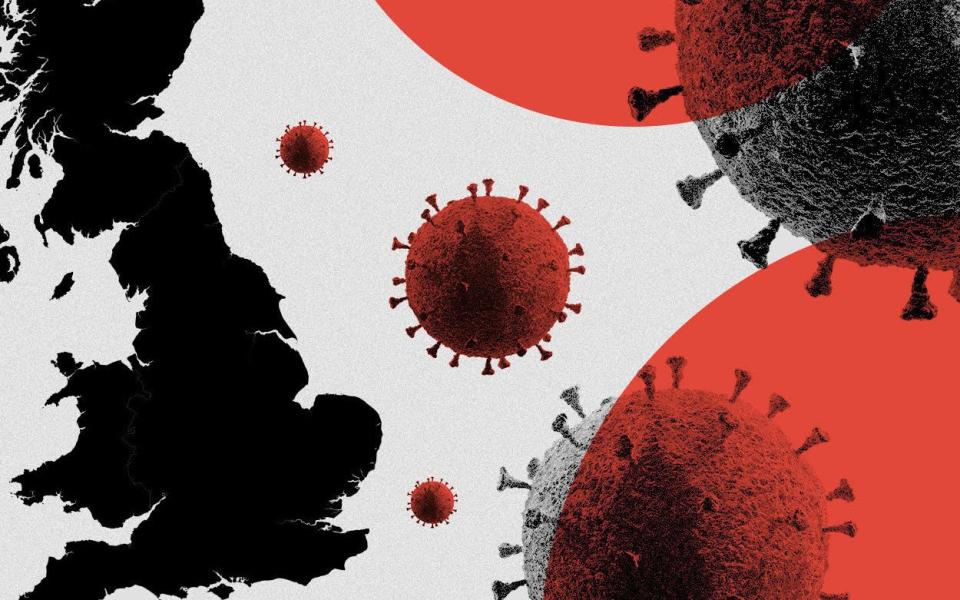Covid pandemic over in Britain, say experts
Watch: COVID-19 - Scientists say vaccines could control pandemic, as Bill Gates optimistic 'the end will come'
Britain is no longer in a pandemic, experts have said, as new data showed the vaccination programme is reducing symptomatic Covid infections by up to 90 per cent.
In the first large real-world study of the impact of vaccination on the general population, researchers found that the rollout is having a major impact on cutting both symptomatic and asymptomatic cases.
Sarah Walker, Professor of Medical Statistics and Epidemiology at Oxford and Chief Investigator on the Office for National Statistics Covid-19 Infection Survey, said that Britain had ‘moved from a pandemic to an endemic situation’ where the virus is circulating at a low, largely controllable level in the community.
The new research, based on throat swabs from 373,402 people between December 1 last year and April 3, found three weeks after one dose of either the Pfizer or AstraZeneca jab, symptomatic infections fell by 74 per cent and infections without symptoms by 57 per cent.
By two doses, asymptomatic infections were down 70 per cent and symptomatic by 90 per cent.
It comes as infections continue to fall in Britain, dropping seven per cent in a week, despite the reopening of schools and shops. Deaths have also fallen by 26 per cent and admissions by 19 per cent over the last seven days.

New data from the ONS also showed that Covid was no longer the leading cause of death in March, falling behind dementia and heart disease, for the first time since October.
Prof Walker, said she was hopeful the vaccination programme could keep Covid under control.
“I am cautiously optimistic,” she said at a briefing discussing the new research. “I think the last three months have shown the combined effect of lockdown and vaccination but long term lockdown is not a viable solution, so vaccines are clearly going to be the only way that we are going to have a chance to control this long term.
“Without vaccines, I don’t think getting close to zero is really feasible in the situation now in the UK where we’re effectively endemic, we’ve moved from a pandemic to an endemic situation.”
But she warned ‘“the virus is always going to throw us curve balls and we’re only a small step away from things going wrong again”.
Commenting on the new research, which was a collaboration between Oxford, the Office for National Statistics (ONS) and the Department of Health, Matt Hancock, the health secretary, said: “Vaccines work, and Thursday’s findings provide further evidence that both the Pfizer and AstraZeneca vaccines are having a significant impact on reducing infections across the UK.”
New figures from the King’s College ZOE symptom tracker app, which has been recording swab data and reported symptoms since the start of the pandemic, also reported a decline in cases by 28 per cent since last week.
The team now expects infections will fall below 1,000 per day in the coming week, close to the record lows of August, and say variants are currently not causing problems.
Watch: How England will leave lockdown
Tim Spector, Professor of Genetic Epidemiology at King’s College London, and lead scientists on the app, told The Telegraph “With the low levels over the past few weeks and with the data from the ZOE app and the other surveys aligned, we are in a very good position.
“Added to the fact that infections after vaccinations are really rare, I would very cautiously say that we could be entering endemic territory, where low levels of infection will be the norm, with occasional minor outbreaks.”Last week, Prof Spector said he believed herd immunity was starting to have an impact on cases.
Weekly Public Health England (PHE) data published on Wednesday showed that antibody levels are now around 60.5 per cent from either infection or vaccination.
Dr Yvonne Doyle, Medical Director at Public Health England said “Our actions are helping to reduce the spread of the virus, with case rates falling in every age group. We are moving in the right direction, let’s keep going.”
New figures from The National Institute of Economic and Social Research (NIESR) estimate that by the time of the next roadmap milestone on May 17, when indoor hospitality can reopen, cases will be down to just 600 a day and hospital admissions below 50 a day - a similar level to early July last year.
Commenting on the Oxford data, Health Minister Lord Bethell added: “These real-world findings are extremely promising and show our historic vaccination programme is having a significant impact across the UK by reducing infections among people of all ages, including those with underlying health conditions”.

